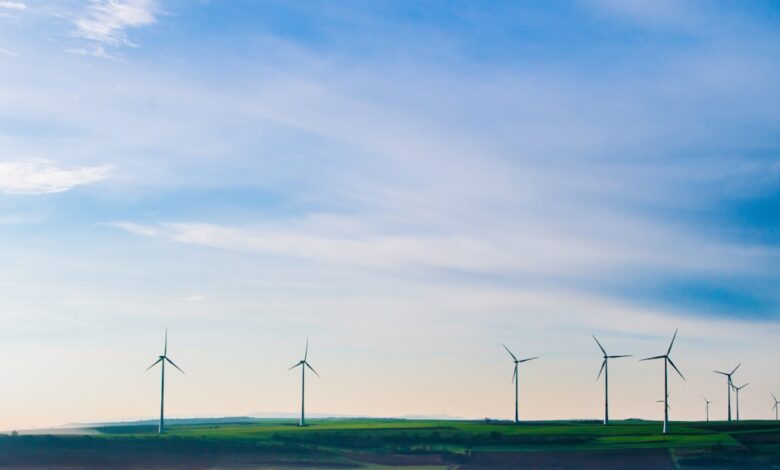Powering the Future: The Role of Nuclear Energy in Achieving a Low-Carbon World

As the world grapples with the pressing challenge of climate change, the transition to low-carbon economies has never been more crucial. Among the myriad of solutions being explored, nuclear energy stands out as a powerful contender capable of delivering large-scale, reliable electricity with minimal greenhouse gas emissions. Despite its storied history and the controversies that often surround it, nuclear energy is poised to play a pivotal role in shaping a sustainable future. In this article, we will delve into the multifaceted future of nuclear energy in a low-carbon world, examining how it can emerge as a key player in the global energy landscape. We will explore the latest innovations in nuclear technology that promise enhanced safety and sustainability, while also addressing the critical role of policy frameworks and public perception in navigating this complex terrain. Together, these elements will illuminate the path forward for nuclear energy as we strive to create a cleaner and more resilient planet.
- nuclear-energy:-a-key-player-in-the-transition-to-low-carbon-economies“>
1. Nuclear Energy: A Key Player in the Transition to Low-Carbon Economies
Nuclear energy has emerged as a pivotal player in the transition to low-carbon economies, primarily due to its ability to generate large amounts of electricity with minimal greenhouse gas emissions. As nations grapple with the urgent need to reduce carbon footprints and combat climate change, nuclear power offers a reliable and consistent energy source that can complement renewable energies such as wind and solar.
One of the defining features of nuclear energy is its capacity for baseload power generation. Unlike solar and wind, which are intermittent and dependent on weather conditions, nuclear plants can operate continuously, providing a stable supply of electricity. This reliability is crucial as countries aim to phase out fossil fuels and transition to cleaner energy systems. By integrating nuclear power into the energy mix, nations can mitigate the risks associated with energy shortages and grid instability, ensuring a seamless transition to a low-carbon future.
Moreover, advancements in nuclear technology, including small modular reactors (SMRs) and next-generation reactors, are enhancing the safety, efficiency, and sustainability of nuclear energy. These innovations promise to reduce waste, improve fuel utilization, and minimize the potential for accidents, addressing some of the public concerns that have historically hindered the growth of the nuclear sector. As these technologies become commercially viable, they offer the potential for nuclear energy to play an even larger role in meeting global energy demands while adhering to stringent environmental standards.
In addition to its emissions profile, nuclear energy can significantly contribute to energy independence and security. Many countries possess substantial nuclear resources, allowing them to reduce dependence on imported fossil fuels. This shift not only enhances national security but also stabilizes energy prices, making economies more resilient to global market fluctuations.
In the context of international climate agreements and national decarbonization goals, the role of nuclear energy is increasingly recognized as essential. Organizations such as the International Energy Agency (IEA) and various national governments have begun to advocate for the inclusion of nuclear power in future energy policies, highlighting its critical contribution to achieving net-zero emissions targets.
In summary, nuclear energy stands out as a key player in the transition to low-carbon economies. Its capacity for reliable baseload power, coupled with ongoing technological advancements and the potential for enhanced energy security, positions it as a vital component of sustainable energy strategies worldwide. As we move forward in the fight against climate change, embracing nuclear energy could be instrumental in building a resilient, low-carbon future.
As the world grapples with the urgent need to reduce greenhouse gas emissions and combat climate change, nuclear energy emerges as a compelling solution in the transition to a low-carbon future. Unlike fossil fuels, nuclear power generates electricity with minimal direct carbon emissions, making it an attractive option for countries aiming to meet their climate goals. The potential of nuclear energy lies not only in its current capacity but also in the innovations that are reshaping the industry.
One of the most significant advancements in nuclear technology is the development of small modular reactors (SMRs). These compact, scalable reactors promise enhanced safety, reduced construction costs, and the ability to be deployed in diverse locations, including urban areas and regions with limited infrastructure. SMRs can be integrated with renewable energy sources to create hybrid systems that optimize energy generation and storage, thereby addressing intermittency issues associated with solar and wind power.
Additionally, the pursuit of advanced reactor designs, such as Generation IV reactors and thorium reactors, holds promise for improved efficiency and sustainability. These next-generation technologies aim to utilize fuel more effectively, minimize waste, and even recycle spent nuclear fuel, reducing the long-term environmental impact of nuclear energy. The potential for nuclear fusion, while still in the experimental phase, could revolutionize the energy landscape by providing a near-limitless source of clean energy if technological hurdles can be overcome.
Public perception and regulatory frameworks are critical factors that will shape the future of nuclear energy. As awareness of climate change grows, there is a shifting narrative around nuclear power, with many recognizing its role in achieving energy security and reducing carbon footprints. However, addressing safety concerns and managing nuclear waste remain pivotal challenges that require transparent communication and robust regulatory oversight.
In a world increasingly focused on sustainability, nuclear energy stands at a crossroads. By embracing innovation and fostering public trust, the nuclear industry has the potential to play a vital role in achieving a low-carbon future, contributing significantly to global efforts to mitigate climate change while ensuring reliable energy supply. As nations explore their energy portfolios, the integration of nuclear power could be a key component in balancing the dual imperatives of sustainability and energy security.





